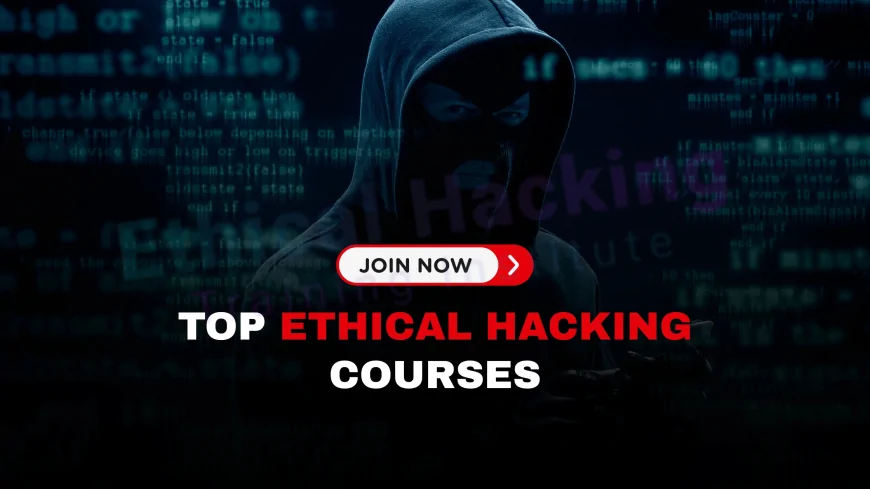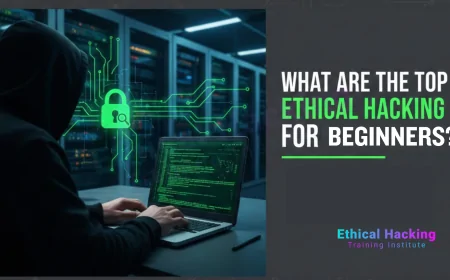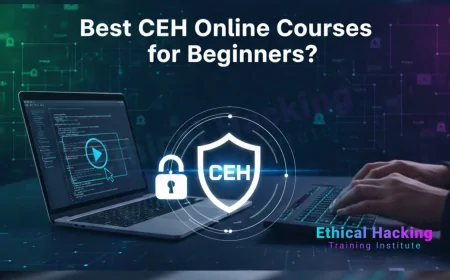Cyber Security Ethical Hacking Course: The Best Resources for Becoming a Certified Professional | Start Your Cybersecurity Career: The Best Ethical Hacking Training Options
Discover the best ethical hacking courses, certifications, tools, and learning platforms to become a certified cybersecurity professional. Start your journey today.

Table of Contents
- Introduction
- What is Ethical Hacking?
- Why Certification Matters in Ethical Hacking
- Types of Ethical Hacking Courses
- Top Certifications for Ethical Hackers
- Best Online Platforms to Learn Ethical Hacking
- Free vs. Paid Courses: What Should You Choose?
- Must-Have Skills for Certified Ethical Hackers
- Lab Tools and Software You Should Learn
- How to Prepare for Ethical Hacking Certification Exams
- Importance of Hands-on Practice and Simulations
- Community Support and Networking Opportunities
- Career Opportunities After Certification
- Real-World Projects to Build Experience
- Recommended Learning Path for Beginners
- Continuing Education in Cybersecurity
- Common Mistakes to Avoid
- Soft Skills for Ethical Hackers
- FAQs
- Conclusion
Introduction
As the digital landscape continues to expand, so do the risks associated with it. Cybercrime is on the rise, and organizations need trained professionals to protect their systems and data. One of the most in-demand roles is that of a Certified Ethical Hacker (CEH). But how do you become one?
This comprehensive guide walks you through the best cybersecurity ethical hacking courses and resources, from certifications to practical tools and platforms. Whether you're a beginner or an IT professional aiming to upskill, this article will show you the exact steps to become a certified ethical hacker in today’s competitive job market.
What is Ethical Hacking?
Ethical hacking involves legally probing systems and networks to find and fix security vulnerabilities. Ethical hackers, or white-hat hackers, are employed to test the security of applications, networks, and systems. Ethical hackers apply the same methods as cybercriminals, but with authorization and the goal of improving system security.
Why Certification Matters in Ethical Hacking
Certification validates your skills and sets you apart in the job market. Many organizations look for certified professionals like CEH, OSCP, and CompTIA Security+ holders. These certifications prove your technical proficiency, ethical understanding, and practical problem-solving abilities.
Types of Ethical Hacking Courses
- Beginner Courses: Beginner-level training provides a strong foundation in digital security, networking, and introductory penetration testing tools.
- Intermediate Courses: Dive into penetration testing, web app hacking, and Linux security
- Advanced Courses: Focus on red teaming, exploit development, and reverse engineering
Top Certifications for Ethical Hackers
- CEH – Certified Ethical Hacker (EC-Council)
- OSCP – Offensive Security Certified Professional
- CompTIA Security+
- eJPT – eLearnSecurity Junior Penetration Tester
- CISSP – Certified Information Systems Security Professional
Best Online Platforms to Learn Ethical Hacking
- TryHackMe – Beginner-friendly hacking labs
- Hack The Box – Advanced hacking simulations
- Cybrary – Free and paid ethical hacking courses
- Udemy – Budget-friendly CEH prep and tutorials
- EC-Council Academy – Official CEH training provider
Free vs. Paid Courses: What Should You Choose?
Free courses offer a good start for beginners to explore the fundamentals. However, paid courses often provide certification preparation, hands-on labs, instructor support, and career mentoring. If you're serious about becoming a certified professional, investing in structured paid programs is recommended.
Must-Have Skills for Certified Ethical Hackers
- Networking fundamentals (TCP/IP, DNS, VPN)
- Linux administration
- Scripting with Python or Bash
- Web application vulnerabilities (SQLi, XSS, CSRF)
- Knowledge of firewalls, IDS, and endpoint security
Lab Tools and Software You Should Learn
- Kali Linux
- Wireshark
- Metasploit Framework
- Nmap
- Burp Suite
- John the Ripper
How to Prepare for Ethical Hacking Certification Exams
Follow this preparation plan:
- Study official courseware and blueprints
- Practice hands-on labs daily
- Take mock exams
- Read blogs and watch YouTube tutorials
- Join community forums for doubt clearing
Importance of Hands-on Practice and Simulations
Theory is essential, but practical exposure is key. Use platforms like TryHackMe or Hack The Box to simulate real attacks in safe environments. The more you practice, the more confident and skilled you become in identifying vulnerabilities and defending systems.
Community Support and Networking Opportunities
Join forums like Reddit’s r/netsec, Discord servers, or local OWASP chapters. Networking with peers, mentors, and professionals helps you learn faster, stay updated, and access job opportunities. Events like DEF CON and Black Hat offer exposure to cutting-edge practices and tools.
Career Opportunities After Certification
Certifications open doors to roles such as:
- Penetration Tester
- Ethical Hacker
- Security Analyst
- Red Team Member
- Cybersecurity Consultant
Real-World Projects to Build Experience
Participate in bug bounty programs, CTF events, and GitHub projects. Write security blogs, submit vulnerability disclosures, and create walkthroughs. Employers value hands-on experience and practical contributions as much as formal education.
Recommended Learning Path for Beginners
- Learn basic networking and operating systems
- Take a beginner cybersecurity course
- Start practicing on TryHackMe
- Get CEH or eJPT certified
- Move to OSCP and advanced topics
Continuing Education in Cybersecurity
Cybersecurity evolves constantly. Enroll in advanced programs, attend webinars, subscribe to newsletters, and experiment in labs to stay relevant and sharp.
Common Mistakes to Avoid
- Skipping foundational topics
- Only watching tutorials without practicing
- Ignoring legal and ethical boundaries
- Using outdated tools and techniques
Soft Skills for Ethical Hackers
- Analytical thinking
- Problem-solving mindset
- Attention to detail
- Clear reporting and communication skills
- Team collaboration and adaptability
Frequently Asked Questions (FAQs)
1. What is the best ethical hacking course for beginners?
TryHackMe and CEH preparation courses on Udemy are great for beginners.
2. Do I need coding to become a certified ethical hacker?
Basic knowledge of Python or Bash is helpful but not mandatory initially.
3. How long does it take to become certified?
It typically takes 3 to 6 months of focused study and practice.
4. Are free ethical hacking courses effective?
Yes, especially for foundational knowledge. For certifications, paid training is recommended.
5. What is the CEH certification?
CEH (Certified Ethical Hacker) is a globally recognized certification by EC-Council.
6. Which is better: CEH or OSCP?
CEH is more theory-based, while OSCP is highly practical and hands-on.
7. Can I learn ethical hacking without a degree?
Yes, certifications and experience often outweigh formal degrees in this field.
8. Are ethical hackers in demand?
Yes, demand is rapidly growing across industries and governments worldwide.
9. What are some good tools to practice hacking?
Kali Linux, Nmap, Burp Suite, Wireshark, and Metasploit.
10. How much can a certified ethical hacker earn?
In India, ₹6–15 LPA. Globally, $70,000–$130,000 annually depending on experience.
11. Can students pursue ethical hacking?
Yes. Many students start learning cybersecurity and get certified during college.
12. What is the best platform to practice live scenarios?
Hack The Box and TryHackMe are the top two practical learning platforms.
13. Is online certification valid for jobs?
Yes, if the certification is from a recognized authority like EC-Council or Offensive Security.
14. Is ethical hacking a full-time job?
Yes. You can work as a penetration tester, security analyst, or consultant full-time.
15. Do ethical hackers work remotely?
Many cybersecurity jobs offer remote or hybrid work setups.
16. Is bug bounty a good career path?
Yes, but it requires skill, patience, and consistent practice. Many earn a full-time income through bounties.
17. Do employers prefer certified professionals?
Yes, certifications prove expertise and increase credibility with employers.
18. Can I start with YouTube tutorials?
Yes. Start with free tutorials, then move to structured paid courses for certification prep.
19. What’s the difference between red teaming and ethical hacking?
Red teaming is a more advanced form of ethical hacking focused on simulating real threats.
20. What is the future scope of ethical hacking?
Massive. As cybercrime grows, so does the need for certified ethical hackers in every sector.
Conclusion
Becoming a certified ethical hacker is a strategic move in today’s digital economy. With the right courses, tools, certifications, and practice environments, you can build a powerful cybersecurity career. Use the resources listed in this guide to master ethical hacking from the ground up, and start your journey toward becoming a certified, skilled, and in-demand professional.
What's Your Reaction?
 Like
0
Like
0
 Dislike
0
Dislike
0
 Love
0
Love
0
 Funny
0
Funny
0
 Angry
0
Angry
0
 Sad
0
Sad
0
 Wow
0
Wow
0

















